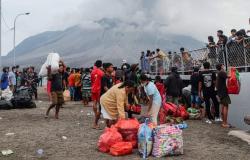Ttwo blond men walk through a forest. It’s dark and cold. They are silent. All things considered, they have been talking for years, they were only condemned to each other by a shared success from long ago. How long have they been on the road? How many of these types of forests have they already crossed? They have now ended up in a part of the world where people no longer look like them. Their suits are frayed, their ties tied around their heads. The two women, colleagues with whom they fled their country, have applied for asylum in Belgium. But they, men alone, have not been welcome there for years.
About the author
Frank Heinen is a writer and columnist for de Volkskrant. Columnists have the freedom to express their opinions and do not have to adhere to journalistic rules for objectivity. Read our guidelines here.
In retrospect, it’s amazing that the Russian attack still took them by surprise, despite the countless cyber attacks, the espionage, the assassinations, the invasions and the fantasies about expansion and scorched earth. One of them, the blondest, still showed his friendship pin. In vain. “You can get it from us in any party store,” the commander shouted after them as he chased them out of the Binnenhof.
Then the wandering started. The same rituals everywhere they went: with the border police to the registration center, weeks, months full of vain hope. The blondest passed the time by complaining about others, while the blonde studied local immigration laws. Sometimes he sat up on his stretcher in the middle of the night and shouted across the dormitory: ‘But then we are actually outside the interregional crisis migration pact!’
In every country they visit, they are viewed with a distrustful eye, as disruptors, unwanted people. The blondest one says it’s a shame that there is no room for them, politicians on the run. According to him, this proves what he has long suspected about other cultures. The blonde reads local newspapers on his iPad and says that they can no longer handle the incessant flow of Western Europeans here. And that there is no need for politicians, because every country is already equipped in that area.
During their endless walks they walk in formation: the blondest in front, the blonde behind, immersed in the historical statutes. First he memorized all the former human rights, and he is currently studying the Refugee Convention, which capsized a few years earlier – it was parked by various countries for so long that the municipality eventually towed it away. What they don’t talk about, never, is the memory of those days in the spring of 2024. When they discussed the influx of asylum seekers. At the table, with coffee. The fact that they determined that they could no longer handle it sounded better than that they no longer felt like it. And that refugees formed the perfect carport under which you could keep any kind of dissatisfaction dry.
In the evening they watch TV in the common room. A discussion program. An advocate of generous reception begins an academic-sounding argument, full of figures, facts about labor migration and compassion.
The blonde one growls in annoyance. Force of habit.
Then: a politician. The men do not know her, the woman speaks in the tone of someone who has not yet taken the opportunity to be humbled by her own mistakes. She speaks of a state of emergency. They cannot possibly accommodate so many Western Europeans, noisy giants with limited adaptability. I’m not mad, Henkie. In the long term, the woman is thinking of a modern, igloo-shaped shelter on Greenland, where the ice is currently melting. But for the time being she prefers to do nothing, afraid as she is of ‘attractive effect’ and ‘nasty upon nay’.
The men look at each other. In a few months they will have to move on again. This is starting to look a lot like an asylum crisis.






